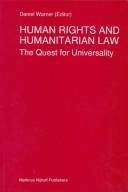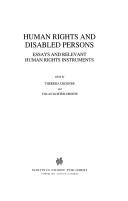| Listing 1 - 10 of 19 | << page >> |
Sort by
|

ISBN: 0792336461 Year: 1996 Volume: 1 Publisher: Boston, Mass. ; The Hague ; London Martinus Nijhoff
Abstract | Keywords | Export | Availability | Bookmark
 Loading...
Loading...Choose an application
- Reference Manager
- EndNote
- RefWorks (Direct export to RefWorks)
Human rights --- History --- mensenrechten --- Droits de l'homme (Droit international) --- Sources --- Human rights - Sources.

ISBN: 9041102418 9041110984 Year: 1998 Publisher: The Hague Kluwer Law International
Abstract | Keywords | Export | Availability | Bookmark
 Loading...
Loading...Choose an application
- Reference Manager
- EndNote
- RefWorks (Direct export to RefWorks)
Technology and law --- Technologie et droit --- Human rights --- mensenrechten --- Human rights. --- Justice. --- Justice --- Droits de l'homme (Droit international)
Book
ISBN: 9290370963 Year: 1996 Publisher: Geneva International Commission of Jurists
Abstract | Keywords | Export | Availability | Bookmark
 Loading...
Loading...Choose an application
- Reference Manager
- EndNote
- RefWorks (Direct export to RefWorks)
Book
ISBN: 9781107657212 9781107063754 9781108463560 1108463568 1107063752 1107657210 Year: 2014 Publisher: Cambridge: Cambridge university press,
Abstract | Keywords | Export | Availability | Bookmark
 Loading...
Loading...Choose an application
- Reference Manager
- EndNote
- RefWorks (Direct export to RefWorks)
How do you keep students motivated when their perception of a subject conflicts with the reality of its academic study? International human rights law, unquestionably an exciting field, is also complex and demanding. With his breakthrough textbook, De Schutter focuses on international human rights law as a global legal system, rather than as a collection of different (though related) rights, giving it relevance and immediacy. Drawing on cases and materials from a wide range of sources, he shows how human rights law is used as a tool to address contemporary issues such as counter-terrorism, global poverty and religious diversity. Materials are organised thematically, allowing readers to make comparisons and connections between different legal treaties and systems. Students can also easily assess how human rights are protected under domestic and international laws. The law is placed in context throughout, ensuring full understanding of why laws exist and how they work.
Human rights --- International law and human rights. --- Droits de l'homme (droit international) --- Human Rights --- International law and human rights --- Human rights. --- Dispositions pénales --- Jurisprudence --- Droits de l'homme (Droit international) --- Droit international et droits de l'homme --- Dispositions pénales. --- Jurisprudence. --- Droits de l'homme. --- Droit humanitaire. --- International law --- Dispositions pénales.
Book
ISBN: 9780231170963 0231170963 9780231539036 0231539037 Year: 2015 Publisher: New York : Columbia University Press,
Abstract | Keywords | Export | Availability | Bookmark
 Loading...
Loading...Choose an application
- Reference Manager
- EndNote
- RefWorks (Direct export to RefWorks)
The United Nations groundbreaking Arms Trade Treaty (ATT), which went into effect in 2014, sets legally binding standards to regulate global arms exports and reflects the growing concerns toward the significant role that small and major conventional arms play in perpetuating human rights violations, conflict, and societal instability worldwide. Many countries that once staunchly opposed shared export controls and their perceived threat to political and economic autonomy are now beginning to embrace numerous agreements, such as the ATT and the EU Code of Conduct. Jennifer L. Erickson explores the reasons top arms-exporting democracies have put aside past sovereignty, security, and economic worries in favor of humanitarian arms transfer controls, and she follows the early effects of this about-face on export practice. She begins with a brief history of failed arms export control initiatives and then tracks arms transfer trends over time. Pinpointing the normative shifts in the 1990's that put humanitarian arms control on the table, she reveals that these states committed to these policies out of concern for their international reputations. She also highlights how arms trade scandals threaten domestic reputations and thus help improve compliance. Using statistical data and interviews conducted in France, Germany, Belgium, the United Kingdom, and the United States, Erickson challenges existing IR theories of state behavior while providing insight into the role of reputation as a social mechanism and the importance of government transparency and accountability in generating compliance with new norms and rules.
Human rights --- International law --- Foreign trade. International trade --- wapenhandel --- Arms transfers --- Arms control --- Export controls --- Armes --- Armements --- Exportations --- Droits de l'homme (Droit international) --- Law and legislation --- Vente --- Droit --- Contrôle --- Arms control. --- Export controls. --- Human rights. --- Law and legislation.

ISBN: 9041104070 9789041104076 Year: 1997 Volume: 29 Publisher: The Hague Nijhoff
Abstract | Keywords | Export | Availability | Bookmark
 Loading...
Loading...Choose an application
- Reference Manager
- EndNote
- RefWorks (Direct export to RefWorks)
Human rights --- Political refugees --- War victims --- Congresses. --- Legal status, laws, etc --- Migration. Refugees --- Refugees, Political --- Victimes de guerre --- mensenrechten --- Law of treaties --- Congresses --- Legal status, laws, etc. --- Droits de l'homme (Droit international) --- Congrès --- Droit --- Human rights - Congresses --- Political refugees - Legal status, laws, etc. - Congresses --- War victims - Legal status, laws, etc. - Congresses

ISBN: 0792332989 9004479899 9780792332985 9789004479890 Year: 1995 Volume: 40 Publisher: Dordrecht: Nijhoff,
Abstract | Keywords | Export | Availability | Bookmark
 Loading...
Loading...Choose an application
- Reference Manager
- EndNote
- RefWorks (Direct export to RefWorks)
Human rights --- mensenrechten --- Social law. Labour law --- People with disabilities --- Human rights. --- Legal status, laws, etc. --- Handicapés --- Droits de l'homme (Droit international) --- Legal status, laws, etc --- Droit --- Basic rights --- Civil rights (International law) --- Rights, Human --- Rights of man --- Disability law --- Law and legislation --- Human security --- Transitional justice --- Truth commissions --- People with disabilities - Legal status, laws, etc. --- Disabled - Right

ISBN: 9050953948 9789050953948 Year: 2004 Volume: 2 Publisher: Antwerpen: Intersentia,
Abstract | Keywords | Export | Availability | Bookmark
 Loading...
Loading...Choose an application
- Reference Manager
- EndNote
- RefWorks (Direct export to RefWorks)
Be as it is the result of the war on terrorism, foreign military intervention, economic globalisation or otherwise, state conduct increasingly affects the human rights of individuals beyond its own borders. This book provides a comprehensive answer to the question whether existing human rights treaties are applicable in such circumstances. The principal treaties on civil and political rights require states to guarantee certain human rights to persons ‘within their jurisdiction’. What is the meaning of these terms? Are states able to evade the application of these treaties by detaining their opponents on foreign soil rather than within their own borders? Does it make a difference to the applicability of these treaties, whether a victim of an extraterritorial assassination by state agents, was a detainee, who had not been arrested? By contrast, treaties on economic, social and cultural rights tend to specifically to provide that states must strive for the full realisation of these rights through international co-operation. The problem here is that the precise nature and content of this obligation is unclear. For example, what is the extent of states' obligations to contribute to sustainable development in other states? What are their obligations as members of the executive bodies of international financial institutions such as the World Bank and the IMF? This book focuses on the extraterritorial application of four key human rights treaties: the two UN Covenants on Human Rights and the American and European Conventions on Human Rights. It reveals that supervisory bodies are inconsistent in their implementation of these treaties and discusses the pros and cons of both a restrictive and a non-restrictive approach.
Human rights --- Polemology --- Droit international --- Droits de l'homme --- Internationaal recht --- Mensenrechten --- Human Rights --- International crimes --- Exterritoriality --- 327.5 --- 342.72/.73 --- Internationale conflicten. Internationale spanningen. Internationale blokvorming. Veiligheidspolitiek --- Exterritoriality. --- Human rights. --- International crimes. --- International offenses. --- 327.5 Internationale conflicten. Internationale spanningen. Internationale blokvorming. Veiligheidspolitiek --- Crimes, International --- International crime --- International offenses --- Crime --- Basic rights --- Civil rights (International law) --- Rights, Human --- Rights of man --- Human security --- Transitional justice --- Truth commissions --- Extraterritoriality --- Jurisdiction, Exterritorial --- International law --- Capitulations --- Universal jurisdiction --- Law and legislation --- Convention europeenne des droits de l'homme (cedh) --- Droits de l'homme (droit international) --- Pacte international relatif aux droits civils et politiques --- Pacte international relatif aux droits economiques, sociaux et culturels --- Exterritorialité --- Droits de l'homme (Droit international) --- Treaties --- Traités
Book
ISBN: 8200213390 Year: 1992 Publisher: Oslo Oxford New York Scandinavian University Press Distributed world-wide excluding Scandinavia by Oxford University Press,
Abstract | Keywords | Export | Availability | Bookmark
 Loading...
Loading...Choose an application
- Reference Manager
- EndNote
- RefWorks (Direct export to RefWorks)
Human rights --- mensenrechten --- Basic rights --- Civil rights (International law) --- Droits de l'homme --- Droits de la personne --- Droits fondamentaux --- Droits individuels --- Grondrechten --- Libertés publiques --- Mensenrechten --- Rechten van de mens --- Rights [Human ] --- Rights of man --- Droits de l'homme (Droit international) --- United Nations --- United Nations. --- Nations Unies --- Nations Unies. --- Rights, Human --- Human security --- Transitional justice --- Truth commissions --- Law and legislation --- Human rights. --- Direitos humanos --- Droits de l'Homme --- Menschenrechte
Periodical
ISSN: 00206393 Publisher: Geneva : International commission of jurists,
Abstract | Keywords | Export | Availability | Bookmark
 Loading...
Loading...Choose an application
- Reference Manager
- EndNote
- RefWorks (Direct export to RefWorks)
Law --- Human rights --- Civil rights --- International law --- Règle de droit --- Juristen. --- Mensenrechten. --- Périodiques. --- General and Others --- Civil rights. --- Human rights. --- International law. --- Law of nations --- Nations, Law of --- Public international law --- Basic rights --- Civil rights (International law) --- Rights, Human --- Rights of man --- Civil liberties --- Constitutional rights --- Fundamental rights --- Rights, Civil --- Law and legislation --- Human security --- Transitional justice --- Truth commissions --- Constitutional law --- Political persecution --- Periodicals. --- Legal status, laws, etc. --- Rule of law --- Droits de l'homme (Droit international) --- Supremacy of law --- Administrative law
| Listing 1 - 10 of 19 | << page >> |
Sort by
|

 Search
Search Feedback
Feedback About UniCat
About UniCat  Help
Help News
News